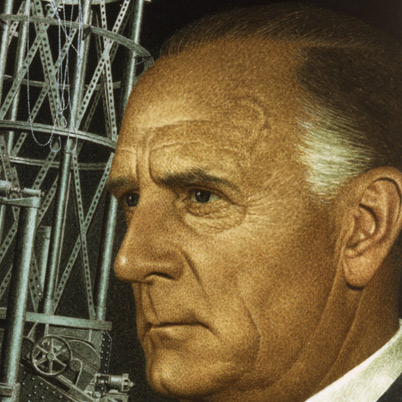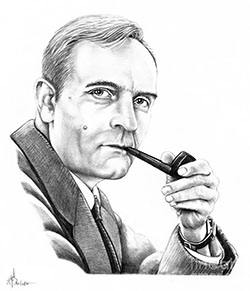|
|
| Edwin Powell Hubble (November 20, 1889 – September 28, 1953) was an American astronomer who played a crucial role in establishing the field of extragalactic astronomy and is generally regarded as one of the most important observational cosmologists of the 20th century. Hubble is known for showing that the recessional velocity of a galaxy increases with its distance from the earth, implying the universe is expanding. Known as "Hubble's law", this relation had been discovered previously by Georges Lemaitre; a Belgian priest/astronomer who published his work in a less visible journal. There is still much controversy surrounding the issue and some argue that it should be referred to as "Lemaitre's law" although this change has not taken hold in the astronomy community.
Hubble is also known for providing substantial evidence that many formerly known "nebulae" were actually galaxies beyond the Milky Way. American astronomer Vesto Slipher provided the first evidence to this argument almost a decade before. Hubble supported the Doppler shift interpretation of the observed redshift that had been proposed earlier by Slipher, and that led to the theory of the metric expansion of space. He tended to believe the frequency of any beam of light could, by some so far unknown means, be diminished ever stronger, the longer the beam travels through space. |
| |
Hubble was born to Virginia Lee James and John Powell Hubble, an insurance executive, in Marshfield, Missouri, and moved to Wheaton, Illinois, in 1900. In his younger days, he was noted more for his athletic prowess than his intellectual abilities, although he did earn good grades in every subject except for spelling. Edwin was a gifted athlete playing baseball, football, basketball, and he ran track in both high school and college. He played a variety of positions on the basketball court from center to shooting guard. In fact Hubble even led the University of Chicago 's basketball team to their first conference title in 1907. He won seven first places and a third place in a single high school track and field meet in 1906. That year he also set the state high school record for the high jump in Illinois. Another of his personal interests was dry-fly fishing, and he practiced amateur boxing as well. His studies at the University of Chicago were
|
 |
| concentrated on mathematics, astronomy and philosophy, which led to a bachelor of science degree in 1910. Hubble also became a member of the Kappa Sigma Fraternity (and in 1948 was named the Kappa Sigma "Man of the Year"). He spent the three years at The Queen's College, Oxford after earning his bachelors as one of the university's first Rhodes Scholars, initially studying jurisprudence instead of science (as a promise to his dying father), and later added literature and Spanish, and earning his master's degree. |
| |
| Edwin Hubble's arrival at Mount Wilson, California, in 1925 coincided roughly with the completion of the 100-inch (2.5 m) Hooker Telescope, then the world's largest telescope. At that time, the prevailing view of the cosmos was that the universe consisted entirely of the Milky Way Galaxy. Using the Hooker Telescope at Mt. Wilson, Hubble identified Cepheid variables (a kind of star; see alsostandard candle) in several spiral nebulae, including the Andromeda Nebula and Triangulum. His observations, made in 1922–1923, proved conclusively that these nebulae were much too distant to be part of the Milky Way and were, in fact, entire galaxies outside our own. This idea had been opposed by many in the astronomy establishment of the time, in particular by the Harvard University-based Harlow Shapley. Despite the opposition, Hubble, then a thirty-five-year-old scientist, had his findings first published in The New York Times on November 23, 1924, and then more formally presented in the form of a paper at the January 1, 1925 meeting of the American Astronomical Society. Hubble's findings fundamentally changed the scientific view of the universe. Supporters of Hubble's expanding universe theory state that Hubble's discovery of nebulas outside of our galaxy helped pave the way for future astronomers. Although some of his more renowned colleagues simply scoffed at Hubble's idea of an expanding universe, Hubble ended up publishing his findings on nebulas. This published work earned him an award titled the American Association Prize and five hundred dollars from Burton E. Livingston of the Committee on Awards. |
| |
|
 |
Hubble spent much of the later part of his career attempting to have astronomy considered an area of physics, instead of being its own science. He did this largely so that astronomers—including himself—could be recognized by the Nobel Prize Committee for their valuable contributions to astrophysics. This campaign was unsuccessful in Hubble's lifetime, but shortly after his death, theNobel Prize Committee decided that astronomical work would be eligible for the physics prize. However, the prize is not one that can be awarded posthumously.
On March 6, 2008, the United States Postal Service released a 41-cent stamp honoring Hubble on a sheet titled "American Scientists" designed by artist Victor Stabin. His citation reads:
Often called a "pioneer of the distant stars," astronomer Edwin Hubble (1889–1953) played a pivotal role in deciphering the vast and complex nature of the universe. His meticulous studies of spiral nebulae proved the existence of galaxies other than our own Milky Way. Had he not died suddenly in 1953, Hubble would have won that year's Nobel Prize in Physics. |
| |
|
Information found at
http://en.wikipedia.org/wiki/Edwin_Hubble |
| |
|

